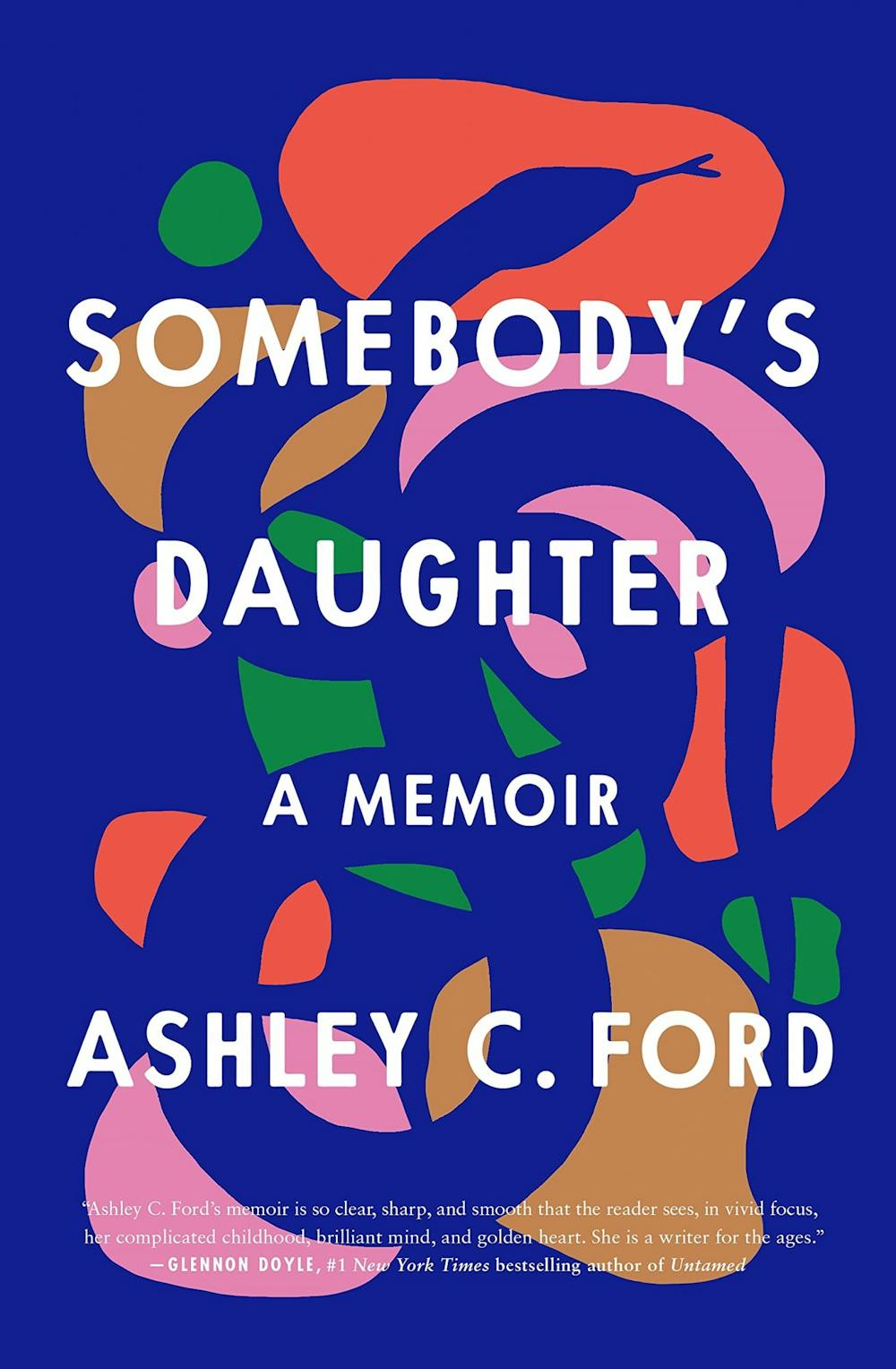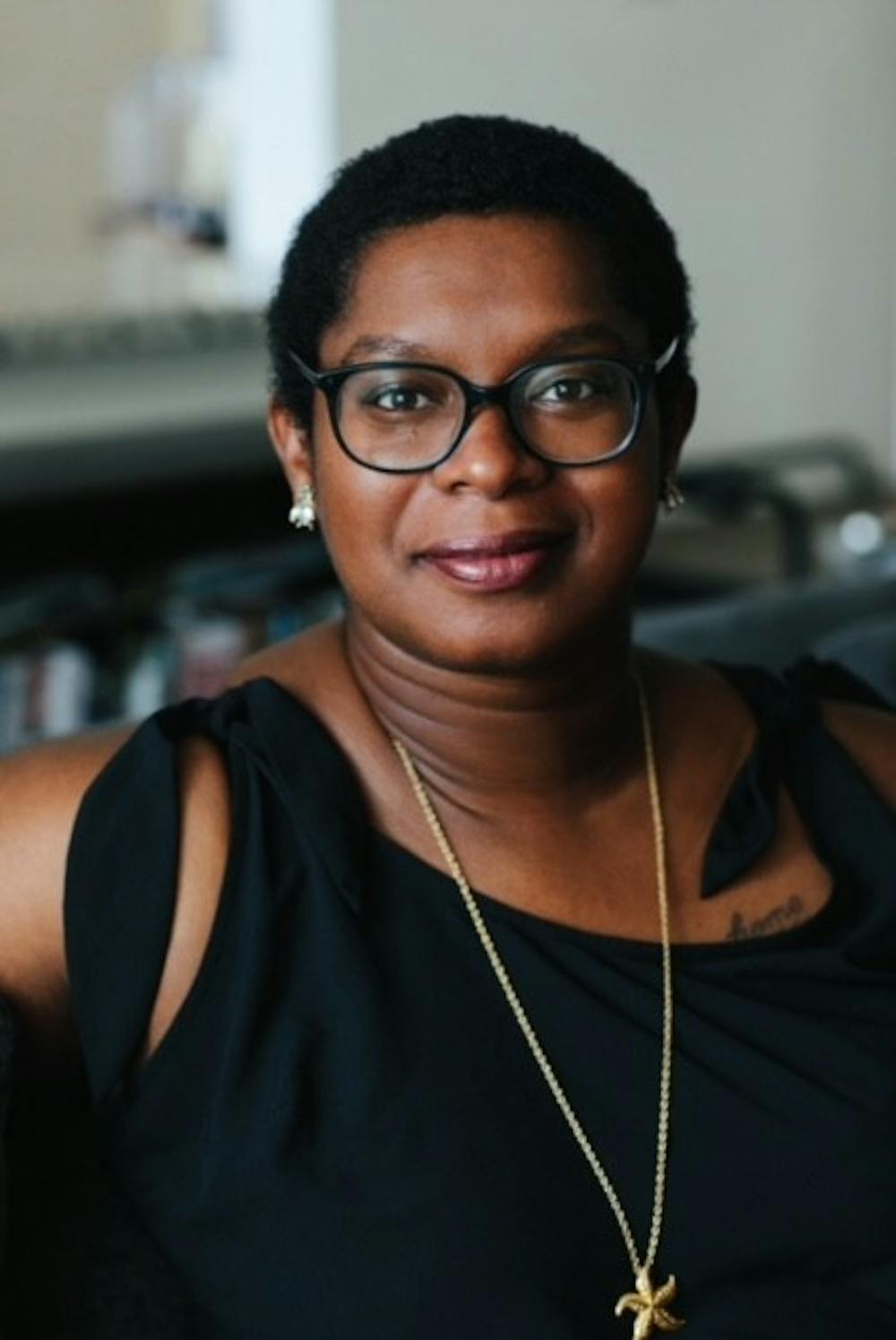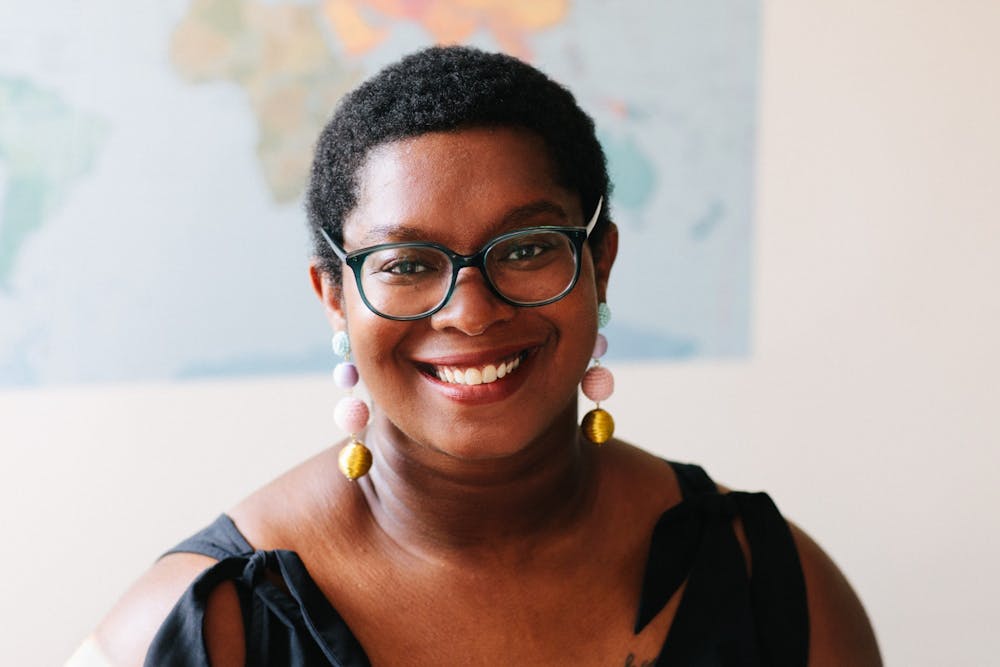Ashley C. Ford is returning to campus this fall as Ball State University’s Fall 2021 Writer-In-Residence. Ford will be a part of three events this semester that are free to the public and will be shared live at bsu.edu/live.
Live book reading of excerpts from “Somebody’s Daughter”: 7:30 p.m. Wednesday, Sept. 15 in Pruis Hall
A conversation between Ford and President Geoffrey Mearns: 7:30 p.m. Thursday, Oct. 7 in Sursa Hall
“Somebody’s Daughter” Book Club with Professor Jill Christman: 7:30 p.m. Thursday, Nov. 11 in Student Center Ballroom
Discovering Her Words
Ashley C. Ford was nearly 10 years old when she felt it might be true she had an inclination toward writing. Ford was sitting in her third-grade classroom during poetry week, and there were two new movies on Ford’s mind that she was “obsessed” with, both starring Leonardo DiCaprio: “Titanic” and “Romeo + Juliet.”
“I wrote a poem about the Titanic called ‘That Big Ol’ Ship Went Down,’’’ Ford said. “My teacher was like, ‘This is amazing. You have such a knack for writing and for poetry.’ I took her opinion seriously. I think it just always stuck.”
Ford, 2018 Ball State alumna and New York Times bestselling author of “Somebody’s Daughter,” always knew she loved reading, she said, so the idea that she could write something somebody else might like reading gave her a lot of confidence and made her feel “special.”
But, while writing was something Ford held onto tightly, paving her path to becoming a writer was challenging. For the first 33 years of her life, Ford said, she had undiagnosed ADHD, which made it difficult for her to apply herself to just one interest of hers.
“College was wild for me because, at one point, it was so stimulating that I wanted to do everything,” Ford said. “While I was at Ball State, I had somewhere between six and seven different majors, but English — creative writing, specifically — was the only major that I didn’t want to give up on. It was the only one that I was like, ‘I can’t wait to take this next class.’ That alone is what helped drive me through that program.”
Ford said she didn't experience one moment when she felt she was destined to be a writer. Instead, she said, she felt she wasn’t “equipped to do much of anything else.” Writing, for Ford, was simply something that she always wanted to do and something that came a bit easier to her than everything else.
“Because I had that extra push of motivation,” Ford said, “it just worked out for me. Thank goodness.”
One of the earliest lessons Ford learned as a student in Ball State’s English department, she said, was how important it is to “just do it,” which meant writing what she wanted. Bad drafts are necessary, and, as a student, Ford learned to push aside her perfectionist tendencies.
“I really felt like, if I didn’t know in my brain how to write the first sentence perfectly, then, how could I write the second sentence?” Ford said. “Which, of course, keeps you from beginning anything at all. Done is better than perfect.”
Since sitting in Ball State classrooms more than a decade ago, Ford has achieved becoming a host of five different podcasts, guest-writing for publications including The Guardian, ELLE and New York Magazine and being named one of Forbes Magazine’s “30 under 30 in Media” in 2017.
As of June 1, she has added New York Times bestselling author to that list.

“The kernel of something stunning”
Nearly 11 years ago, Ford was sitting in Jill Christman’s ENG 406 advanced creative nonfiction writing class, where memoir writing was what Christman had decided to focus on for the semester.
There weren’t many students sitting in the dilapidated desks, typing away on their boxy laptops and following the creative instructions Christman gave for every memoir assignment they had during those 16 weeks, but they were driven, Christman said, Ford more so than others.
“Jill Christman infected me in her class,” Ford said.
Christman, Ball State professor of English, had been teaching creative writing for more than 15 years, which made it easy for her to know which students of hers “lived by writing.” Ford was one of those students.
Christman first met Ford at the Broken Plate issue launch at the Inprint Festival of First Books, where Ford was standing at a table promoting the student literary journal.
“She told me a joke. I kind of remember it, but I’m not going to repeat it, and we both really laughed,” Christman said. “So, my first memory of Ashley is of us laughing together, and I would say that never changed.”
Upon working with Ford in her creative writing course, Christman said she began to see the light that Ford carried with her everywhere she went.
“What made her stand out was that she was her big-hearted, giant-brained luminous self,” Christman said, “and she showed up to do the hard work of writing that we were doing that semester.”
In 2010, Ford wrote a two-paged, single-spaced essay for Christman’s class titled “Brush and Floss,” a shorter memoir highlighting her grandmother, who is an important figure in her life and someone who would one day become one of the main characters of her bestselling book.
“I was writing notes on this essay,” Christman said, “and I talked about her grandmother as a character here, and the way in which Ashley captures her dialogue — which I do think is something brilliant about Ashley’s writing, the way in which she listens to the people around her and then makes them real for us on the page.”
For more than a decade, Christman has held onto the notes she wrote on “Brush and Floss,” notes where, at the very end, she wrote, “This is the kernel of something stunning, Ashley — no doubt, a whole book.”
Ford remembers reading that note from Christman. That was the time she realized that there was a story in the parts of her life she “replayed a lot.”
“I’d written this essay that would go on to become sort of one of the core essays that I’ve written over my career,” Ford said. “The first place I ever wrote that out was in Jill Christman’s class.”
The story Ford told in “Brush and Floss” is now one of the most notable chapters of her memoir and inspired the cover art for “Somebody’s Daughter,” which sits on bookshelves around the world, including those of Oprah Winfrey and Glennon Doyle.
What was once a college essay turned into an instant New York Times bestseller.
“If you think about it, it’s kind of wild, no?” Christman said.
Finding Her Niche
When Ford first stepped foot on Ball State’s campus, she was a public relations major and “almost immediately” changed to a double major in fashion merchandising and apparel design. It wasn’t until she changed her major nearly five times that she met Sean Lovelace, department chair of Ball State’s department of English.
Lovelace worked with Ford in a handful of his creative writing classes, and, while her writing stood out, the most memorable thing about Ford for him was her light.
“She almost glows,” Lovelace said. “She has this big personality, and she’s super outwardly. You can almost feel kindness emanating from her. She is kind, and she has a great personality, and that didn’t change.”

Lovelace has taught creative writing at Ball State for 16 years, and while he said it’s not unusual to have a student with a unique personality in his classes, personality isn’t what creative writing is about. Creative writing is about getting the work done, and, for Lovelace, one of the first things he noticed about Ford was her work ethic.
“I watched Ashley in the class as a person,” Lovelace said, “Once I started working with her on revisions, she did the work. She prepares herself for writing and gets herself into the mood, and that’s what’s really important. She has the writer's exterior but she also has that really hard work ethic.”
Lovelace said Ford was one of the students who stood out to him most because of her ability to write not only to tell a story, but to write to get better at writing. Ford understood writing as a craft that required work, and that helps to make any writer successful.
When Ford was an undergraduate, Lovelace said she was part of a group of students in the English department with “a spirit that really stood out.”
Ford and the other students were involved in all of the co-curricular activities in the English department, including the literary magazine and festivals. The group even went as far as to hold their own readings outside of the English department.
Lovelace finished teaching Ford in 2018, but he has stayed involved in her whereabouts, checking her Twitter occasionally and watching Ford’s interviews. While scrolling through Ford’s Twitter account last summer, Lovelace said Ford’s tweets had “the exact personality traits she had in my class.”
“I think one of her key traits is she’s always giving back to others,” Lovelace said. “I learned that from her. Anyone who’s like that makes you want to be a better person.”
“Time to Start”
While Ford began her memoir, “Somebody’s Daughter,” in 2010 with the “Brush and Floss” essay she wrote in Christman’s class, she officially began work on her book’s transcript in 2017.
“I knew it was time to start when I was at a point in my life where I had worked for these media companies in New York," Ford said. "I had written for all of these amazing publications that weren’t even on my dream list of publications to write for. In 2017, I really was in a place of, ‘OK, everything else is going on the back burner.’”
Until her memoir was complete, Ford said, her main focus was entirely on her book: writing, editing, revising, selling and publishing. Pieces of her memoir lived in journals on her bookshelf and around her house, documents tucked away in folders in the depths of her computer harddrive and notes on her phone.
“There's a time where you’ll be walking with a friend somewhere and suddenly remember something that happened when you were 11,” Ford said. “Having to grab a receipt and write everything so you don’t lose it, then taking a picture of the back of the receipt in case you lose the receipt, then putting [the picture] in a special folder in your phone.”
Because she has written so much in so many places, Ford said, she hasn’t been able to get rid of her old computers in 10 years because they may have a piece of something she will one day need.
“It’s like you have your pile of junk,” Ford said, “and you have to put all your piles of junk together, synthesize them, think about what stories belong to which parts of your story, who’s connected to those stories … Sometimes, it all just comes out, and other times, you really do have to almost physically put it together.”
Ford said piecing together her memoir wasn’t a simple process, but it helped her to realize writing is more of a construction than some may think. Until you are sitting in front of your computer with different parts to your story, Ford said, it isn’t entirely clear just how much goes into writing a book.
“There’s the sitting down, the typing and getting the words out,” Ford said, “but, then, there’s the part where you’re kind of ripping it apart and putting it back together, ripping it apart and putting it back together. That revision part, to me, is my favorite part.”
Writing and revising was a stimulating process for Ford, she said, and it taught her that her ability to write a book is not “a fluke.” While each book is different and needs to be constructed and conceived in its own way, Ford said she knows she is capable of completing the process.
“I know for the rest of my life that if I ever decide to write a book, I’ll never be able to tell myself again that I have no idea if I can write a book,” she said. “That’s really the best thing I gave myself with this book, was that, if I want to do it again, I’ve got enough confidence to try.”
While Ford was writing, she held her book “really close to the vest for an abnormally long time,” deciding not to share her story with her closest friends and family until it was ready for publication. While some of Ford’s peers received a galley or digital version of her book beforehand, most of them had to wait to read her story until it was out on shelves.
Ford said she knew her book needed to be hers and only hers for as long as she needed until she was ready to share it with a community of people she felt comfortable with, so that, when it came time to hear the reactions of the public, she would have those people behind her and supporting her.
“I knew that this book required a kind of vulnerability from me that I had to acquire while I was working on it,” Ford said. “Thank God I did, because that had let me know that, when the book came out, I had to be in a certain mental and emotional space in order to deal with that.”
When Ford was ready to publish at the end of 2017, she and her agent sent her book proposal out, met with 14 different publishers and officially sold her book at an auction. Flatiron Books then purchased her transcript for publication.
Making it Her Own
Writing a book is a different process for every author, Ford said, and her journey was an emotional one, packed with digging through memories of her childhood that she kept to herself until she felt ready to share her story.
For Ford, writing her memoir was a process that required vulnerability and maturity, but one that allowed a part of her to finally speak up.
“Part of the reason why I wrote this book was because I was determined to allow the part of me that had felt silenced by the dynamics of my family to have her own say,” Ford said. “To have a moment just to tell her story, knowing it was worth telling, and that it didn’t matter if it matched anybody else’s story because it was hers, and she believed herself to be an honest person — a person who tells the truth, and that’s enough.”

In order to write her memoir, Ford had to trust herself to tell her story “without turning anybody into a hero or a villain.” While she knew some members of her family would question whether or not she should include aspects of her life in her book, Ford said she didn’t want to give family members the opportunity to put doubt in her mind.
“I wanted [a certain] part of me to get to have her say,” Ford said. “That was my main objective.”
The part of her memoir Ford is most proud of is finally being able to tell her mother, as an adult, what happened to her as a child.
“That was one of those moments where I was really testing the whole ‘I trust myself ‘ thing,” Ford said. “I trust myself, and I love myself, and I deserve to be heard and tell the truth. That was a big moment for me, and I was worried that I wouldn’t be able to write it out for some reason. I was scared I wouldn’t be able to share that with people, and I think I did it in a way that was good.”
Ford said she hopes being vulnerable and sharing her story makes others want to write about themselves and tell stories of their own — stories that maybe they have suppressed, too, and are finally ready to share with the world.
She hopes her story makes readers want to honor their own, to tell their story in whichever way they seem fit. Whether it be through writing, composing photos, music or a writing play, Ford said she hopes she can inspire people to express themselves and tell their stories through unique experiences of their own.
“I want them to think, ‘You know what? If Ashley could find just enough confidence within herself to tell her own story, I can too,’” Ford said. “‘I am worth telling my own story.’”
Ford doesn’t care if those she inspires never publish their stories or make them public. What matters most, she said, is that they do what feels right for them and share their story in the way they are most comfortable.
What she wants her readers to understand is that it is not their job to keep secrets on behalf of those who have hurt them, she said. Their experiences are not somebody else’s secret.
“Everybody makes choices,” Ford said. “We shouldn’t have to live with the consequences of other people’s actions in a way that causes us suffering. Pain is going to happen — that’s human as hell. Pain is going to find us in the world, but suffering is different. Suffering is prolonged pain when the pain does not have to be prolonged. Anybody that asks you to suffer isn’t loving you.”
Contact Taylor Smith with comments at tnsmith6@bsu.edu or on Twitter @taywrites.





